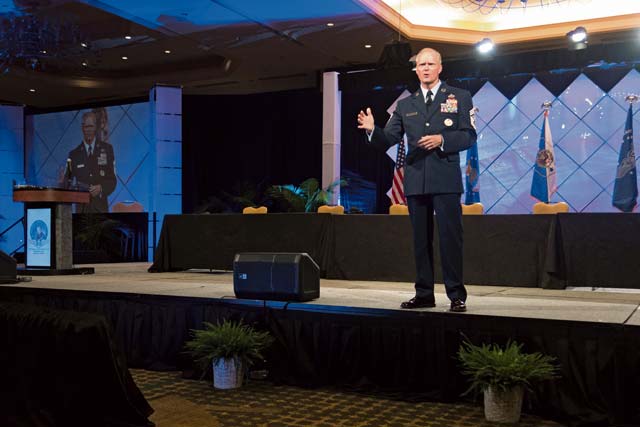
Chief Master Sgt. of the Air Force James A. Cody speaks to an audience of current, former and retired Airmen at the Air Force Sergeants Association Professional Airmen’s Conference in Jacksonville, Florida.
JACKSONVILLE, Fla. — The Air Force’s top enlisted leader focused on the future force, the new enlisted evaluation system and professional development during the Air Force Sergeants Association Professional Airmen’s Conference here Aug. 19.
Chief Master Sgt. of the Air Force James A. Cody addressed an audience of Airmen, former enlisted and retired NCO members of the association where he talked about the challenges of a smaller Air Force and the impact it is having and will have on its Airmen.
Cody emphasized that today and tomorrow’s Air Force will be the smallest, most globally engaged force in its history and that programs such as evaluations, promotions and professional education will need to evolve as the Air Force as a service evolves.
“If we’re going to develop leaders of the future, and ask them to do things that today we don’t even know have to be done, we have to evolve,” Cody said.
Cody said he believes that Airmen develop along a path much like the structure of a pyramid.
“If we’re going to develop Airmen of the future, it’s important not to just measure Airmen functionally, not to just make sure they are exquisite at their job,” he said. “They have to have greater breadth and depth in a professional force like this. You have to think about the development of special duties and how it builds an Airman in a different way.”
Cody said he believes the Air Force needs to look at how to manage Airmen as a human capital strategy, looking out for the needs of the Air Force, while continuing to purposefully nurture and grow its Airmen along the way.
“When you have a smaller force, you have to make sure the Airmen have the skill sets needed,” Cody said. “Maybe 10 years ago, this idea that (Airmen) would have a lot more say in what (they) would be doing for our Air Force was reasonable. We had enough people to allow for it, we had enough qualified people to do what we needed to do.
“When you get smaller, you can’t do that. You can’t allow yourself to fall short, because the minute you fall short you’re creating that hole for everyone to catch up,” he continued. “If we need you to do something as a staff sergeant, we need you to do something as a staff sergeant. So that when you’re a master sergeant you’ll have the skills to do what our Air Force needs you to do.”
Cody said he believes that Airmen have to rethink about what their commitment to serve is about.
“You can’t be solely functional. You can’t be so connected that when your Air Force asks you to do something else that you can’t be the most dedicated Airman and do what your nation expects,” he said.
(For the full story, visit www.ramstein.af.mil.)


